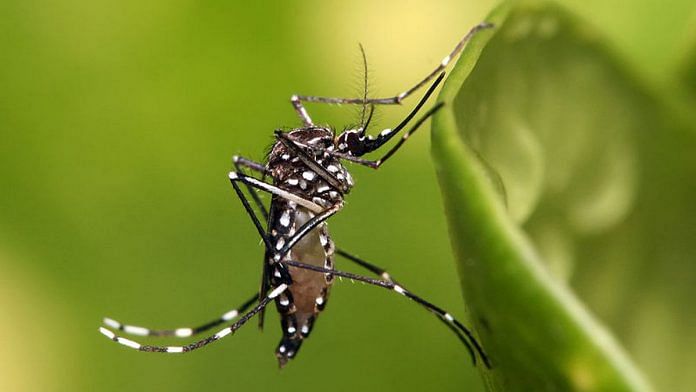New Delhi: Infecting mosquitoes with a naturally-occurring bacterium can help curb the spread of dengue by 77 per cent, scientists have claimed on the basis of a randomised trial in Indonesia, one of the countries where the disease is endemic.
The bacterium in question is the Wolbachia pipientis. It naturally occurs in 60 per cent of insect species but not in the Aedes aegypti mosquitoes, which are carriers of diseases like dengue, Zika, chikungunya and yellow fever.
The trial was carried out over two years by scientists from the World Mosquito Program (WMP) of Monash University in Australia and Universitas Gadjah Mada in Indonesia.
The researchers described the trial as the culmination of a decade of laboratory and field studies, beginning first in Australia and then expanding to 11 dengue endemic countries.
“This exciting result of the trial is a great success for the people of Yogyakarta. Indonesia has 7 million dengue cases every year. This trial result shows the significant impact the Wolbachia method can have in reducing dengue in urban populations,” WMP Indonesia Principal Investigator Adi Utarini of Universitas Gadjah Mada said in a statement.
The researchers have stated that detailed results of the trial will be presented at an international scientific congress in November 2020 and published in a peer-reviewed journal.
Under the Wolbachia method, researchers introduce the bacterium into Aedes aegypti mosquitoes in the laboratory and release them into the wild. When the Wolbachia-infected mosquitoes breed with their wild counterparts, the percentage of mosquitoes carrying the bacterium grows.
It is not fully understood why the Wolbachia bacterium interferes with the transmission of dengue. One theory is that the bacterium prevents dengue viruses from replicating in mosquito cells.
Researchers at WMP, which has pioneered the Wolbachia method, say it does not suppress mosquito populations or involve genetic modification, and that it’s safe for humans, animals and the environment.
Also Read: Covid-dengue ‘co-infections’ are Bengal’s new challenge as doctors say treatment very tricky
How the trial was conducted
For the Indonesia trial, the researchers released Wolbachia-carrying Aedes aegypti mosquitoes — bred by the WMP — into Yogyakarta city. Twenty-four similarly-sized areas of Yogyakarta city were selected for the study.
Of these, 12 were chosen at random, where Wolbachia-infected mosquitoes were released in addition to routine dengue control measures. The remaining 12 continued to receive routine dengue control efforts.
The trial area had covered a population of approximately 312,000.
The team studied the incidence of dengue in the areas over a 27-month period. The areas where Wolbachia-infected mosquitoes were deployed had a 77 per cent lower incidence of dengue.
Dengue is a viral disease that is endemic in many countries, including India. Although it usually results in mild illness, severe dengue infections can sometimes prove fatal. World Health Organization (WHO) estimates suggest an annual incidence of 100-400 million dengue infections every year, with its global incidence growing dramatically “in recent decades”.
The researchers’ claims about the Wolbachia trial suggest it could help cut dengue incidence dramatically.
Also Read: Mosquitoes kill more people every day than sharks do in a century



